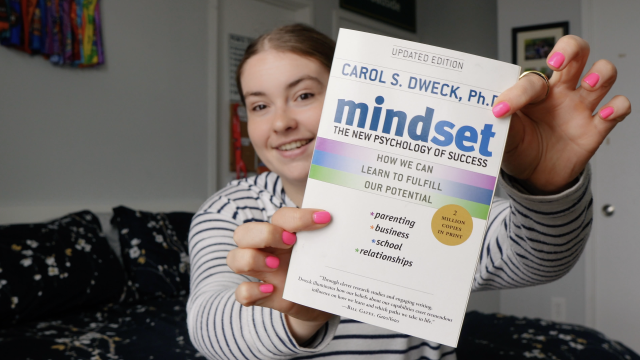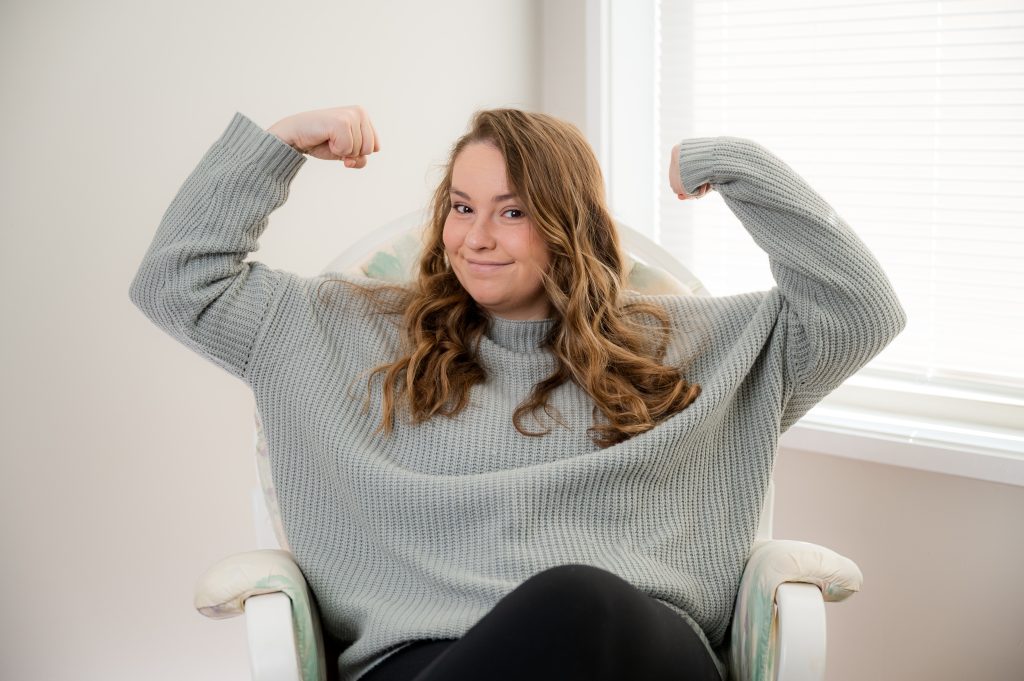As a personal development expert with a PhD in the Science of Mindset and Behavior Change, I am frequently asked about my favorite self-help books. In this blog, I am finally going to answer that question.
However, before I reveal my recommendations, I want to pose three important questions for you to consider before impulsively purchasing any self-help book.
Now, I must admit that I’m no stranger to impulse buying. My name is Dr. Karin Nordin, and I have been a self-help enthusiast for years. I began reading these books long before pursuing my PhD, and what sets apart my recommendations is that they are backed by real science.
Through my academic journey, I have dived deep into the scientific understanding of mindset and behavior change, enabling me to critically analyze whether these books accurately represent the evidence they discuss.
So, this is not simply a recommendation from someone living her best life; it is a recommendation from someone who can evaluate the accuracy and reliability of the information presented. Every book I recommend aligns with the scientific principles that underpin personal growth and transformation.
Before I unveil the five self-help books, I want to invite you to reflect on three essential questions about your motivation for seeking a self-help book.
Grab your pencils, bullet journals, or feel free to share your answers in the comments below. Let’s dive in and discover the right path for your personal development journey.
Question 1: Are you searching for entertainment or an escape?
Here’s the honest truth: nothing you read in a self-help book is going to magically change your life. Believe me, I’ve been in that desperate place where I found myself endlessly buying book after book, hoping to fix and change parts of myself.
But let me tell you, the answer you seek is not hidden within the pages of these self-help books. I can say this with confidence because I’ve not only read countless self-help books myself, but I’ve also coached hundreds of individuals on their personal development journeys. The key to behavior change doesn’t lie solely within the words written on those pages.
If you approach self-help books as a means of escaping your current life, your personality, or your reality… I must warn you, it won’t be a fulfilling experience.
Self-help books are not designed to provide an escape. They are meant to offer insights and facts about behavior, and sometimes they can be engaging and enjoyable to read. However, true behavior change cannot be found solely within the confines of a book.
Now, don’t get me wrong—I still read self-help books as a behavior change expert. But I approach them with a different mindset. I see them as a source of entertainment, much like watching TV or flipping through a magazine.
I understand that there’s a lot of questionable content out there, and I don’t take it too seriously. It’s simply a way to engage my curiosity and find some enjoyment in the process. In essence, I read self-help books in the same way the seventh-grade version of myself would read Cosmo Tips.
It’s important to clarify your intentions before delving into the world of self-help books. Understanding your motivations will help you approach them with the right mindset and make the most out of your reading experience.
Question 2: Have you taken action on what you’ve learned from previous books?
Since you’re here reading this blog, I assume you’ve already delved into several self-help books. You might even be like me, with a whole shelf of books, some of which you haven’t read yet, and others that you never finished.
Let me share a personal story with you: I once purchased the book “Finish: Give Yourself the Gift of Done,” but ironically, I never finished reading it. This brings us back to the second question: Will you actually take action based on what you read?
If your struggle lies in following through on the things you say you’ll do, then simply acquiring information won’t bridge that gap. This is where the application of coaching worksheets becomes invaluable, and we provide a range of them within our Change Academy membership.
It’s essential to recognize that reading self-help books alone won’t automatically lead to tangible changes in your life. The true power lies in your ability to implement the insights and strategies you gain from these books.
So, before you dive into another self-help book, ask yourself if you’re ready and committed to taking action based on what you learn. If you struggle with follow-through, consider seeking additional resources or support, such as coaching worksheets or joining a community that can provide accountability and guidance.
Remember, knowledge without action is like having a map without taking a single step forward. Take the lessons from your previous readings and apply them in your life to create meaningful transformations.
Question 3: Are you seeking a broad understanding or specific expertise?
This is a crucial consideration, especially when it comes to self-help books that have been around for several years. While I’ll discuss this in more detail when we get into the books, it’s essential to note that many of these highly regarded books are not necessarily the best source for the latest information or in-depth understanding.
If you’re a coach, an educator, or someone seeking the most up-to-date scientific knowledge, these books may not be the ideal choice. They are primarily written for the general population, often stretching the boundaries of what the science actually states in order to support their claims.
They are designed to entertain and engage readers, rather than providing a comprehensive and accurate understanding of the underlying science behind behavior change.
However, if your intention is to read for entertainment, if you have already applied the knowledge you gained from previous books, and if you recognize that these books offer a broad and simplified understanding of concepts, then they can be a valuable resource for you.
So, if you answered “yes” to these criteria, then I’m thrilled to recommend five self-help books that align with your needs. These books will provide you with insights, inspiration, and practical strategies that can positively impact your personal development journey. These books have personally influenced me and are backed by real science.
Let’s dive into the recommendations and explore the valuable lessons they have to offer.
Top 5 Recommended Self-Help Books:
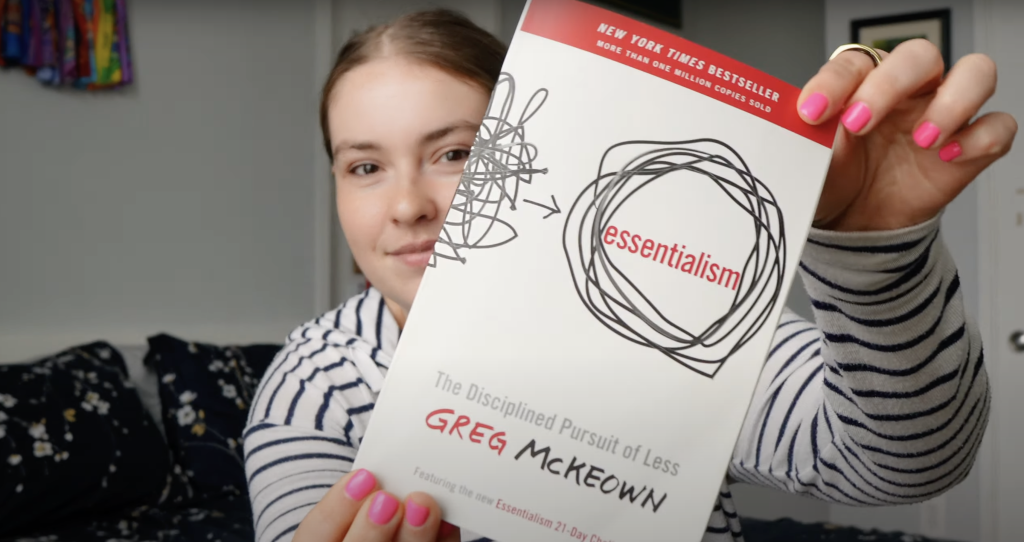
Book #1: Essentialism by Greg McKeown
Let’s kick off our list with a book that has had a profound impact on my own mindset: Essentialism by Greg McKeown. What sets this book apart is its unique approach—it doesn’t rely heavily on scientific jargon or convoluted arguments. Instead, Essentialism aims to shift your perspective and guide you towards a more focused and intentional way of living.
Essentialism revolves around the idea that we need to do less. It introduces the concept of essentialism as the strategic art of doing less but better.
Personally, this book resonated deeply with me because, for the longest time, I found myself constantly juggling multiple jobs, projects, and commitments, yet always feeling like I was running a race I couldn’t finish. Essentialism provided me with the much-needed clarity on why this was happening.
If you frequently find yourself overwhelmed by the multitude of tasks and responsibilities, struggling to prioritize and focus, then Essentialism is the perfect book for you. It offers practical insights and strategies to help you streamline your life, eliminate non-essential activities, and concentrate on what truly matters. By embracing the principles of essentialism, you can regain control of your time, energy, and attention.
So, without a doubt, my number one recommendation is Essentialism by Greg McKeown. Prepare to be inspired and equipped with the tools to live a more meaningful and fulfilling life.
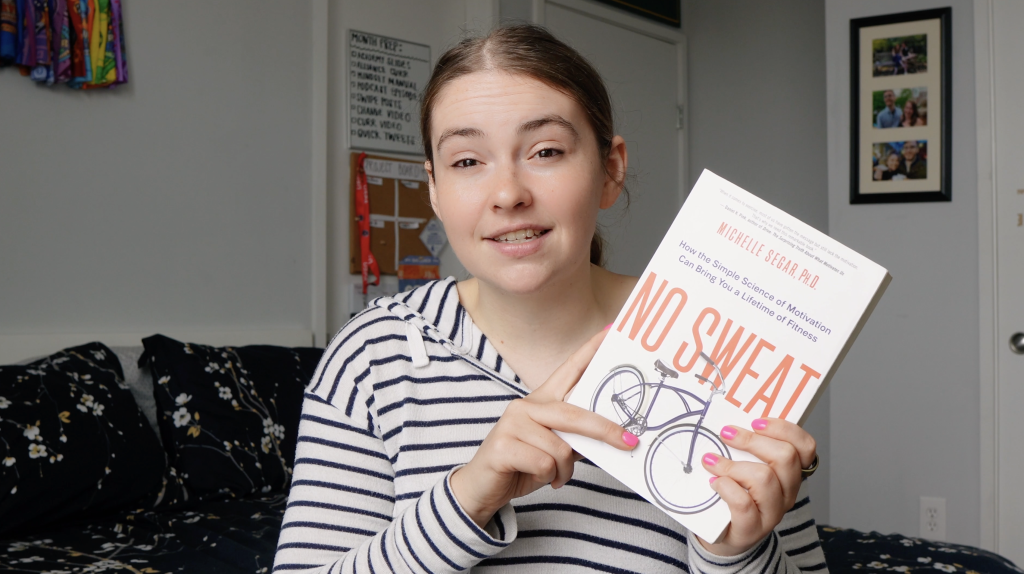
Book #2: No Sweat by Dr. Michelle Segar
Here’s another perspective-altering book that I highly recommend: “No Sweat” by Dr. Michelle Segar. Unlike many self-help books, this one doesn’t overwhelm you with scientific jargon or inundate you with tools you won’t apply.
As someone who has seen countless individuals struggle to implement advice from books, I understand the need for a different approach.
Dr. Segar, a PhD-level scientist, dives into the transformation of our relationship with movement. When I read this book years ago, it truly shifted my mindset. If you find yourself grappling with exercise consistency, feeling guilty about not hitting the gym, or struggling to incorporate movement into your daily life, “No Sweat” offers invaluable insights.
Say goodbye to the exercise treadmill of guilt and discover a healthier, more sustainable approach to physical activity. Dr. Segar’s expertise will empower you to navigate the challenges and embrace a more fulfilling relationship with movement.
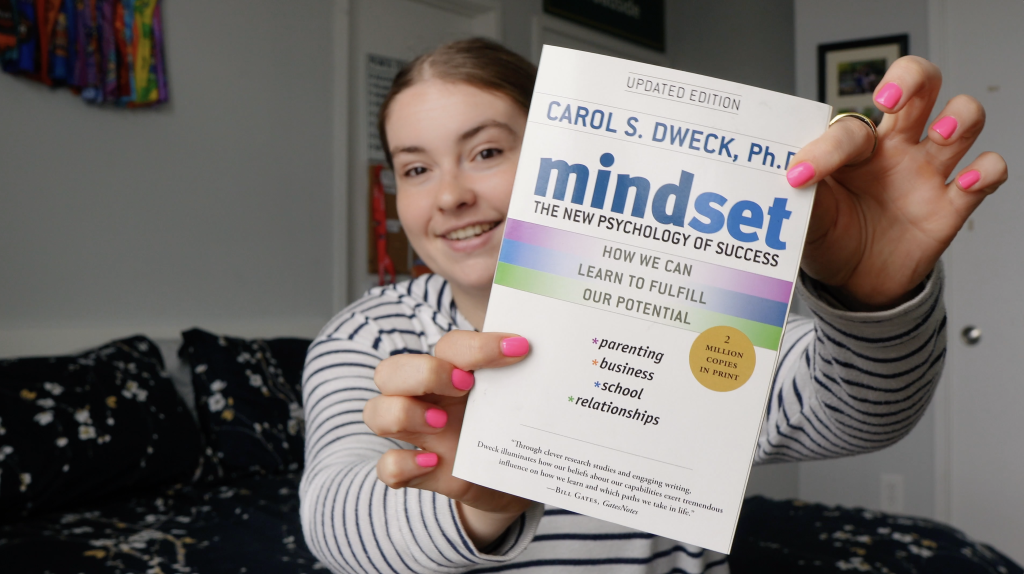
Book #3: Mindset by Carol Dweck
If you’re seeking a foundational understanding of growth mindset, then “Mindset” by Dr. Carol Dweck is a must-read. It revolves around the belief that our abilities can change and develop over time. Dr. Dweck, a prominent researcher who began studying growth mindset in the 1980s, condenses 28 years of research into this comprehensive guide.
However, it’s important to note that this edition of the book was last updated in 2011. Since then, there have been significant advancements in our understanding of mindset theory. As a published PhD researcher in mindset theory, I’ve explored the latest research extensively and shared it in my Change Academy program.
While “Mindset” may not cover all the recent findings, it still provides a solid introduction to the concept and its significance. If you’re new to growth mindset and eager to grasp its fundamentals, this book serves as an excellent starting point.
But if you’re a coach or someone working with others, and you want to stay up-to-date with the latest knowledge on growth mindset, I recommend exploring additional resources, including those available in Change Academy.
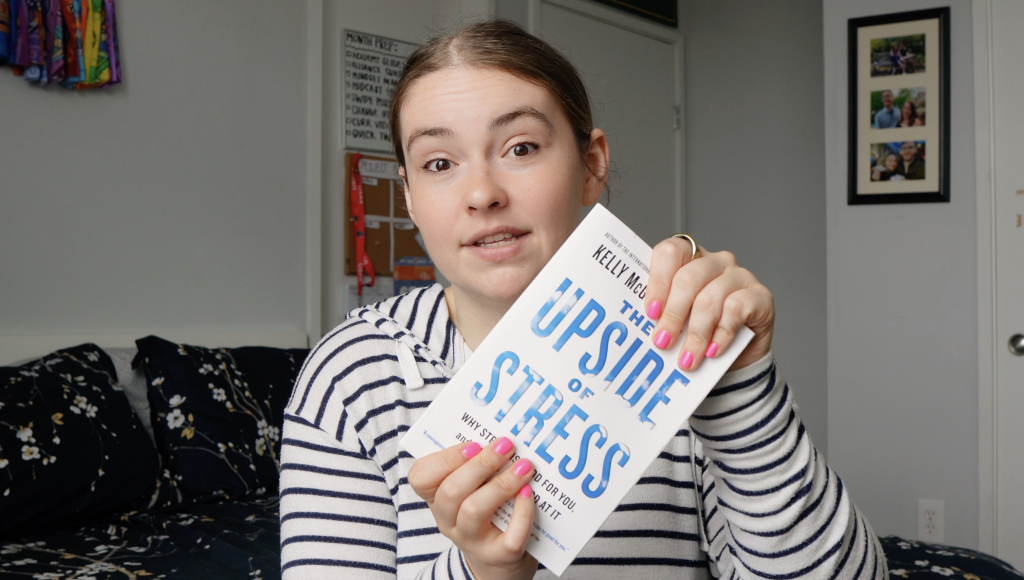
Book #4: The Upside of Stress by Dr. Kelly McGonigal
“The Upside of Stress” by Dr. Kelly McGonigal is a recent favorite of mine. What sets this book apart is its empowering approach to summarizing research. Unlike many other books, it ethically acknowledges the limits of our current knowledge and encourages readers to explore and experiment with the suggestions provided.
One of the key reasons I recommend this book is because it challenges common misconceptions about stress. If you’re looking for a concise overview, I also have a video on stress where I touch upon similar themes here.
However, if you’re seeking a transformation in your relationship with stress and feel the constant pressure to minimize it, this book will be an invaluable read for you. It offers insights and strategies that can help shift your perspective and harness the positive aspects of stress.
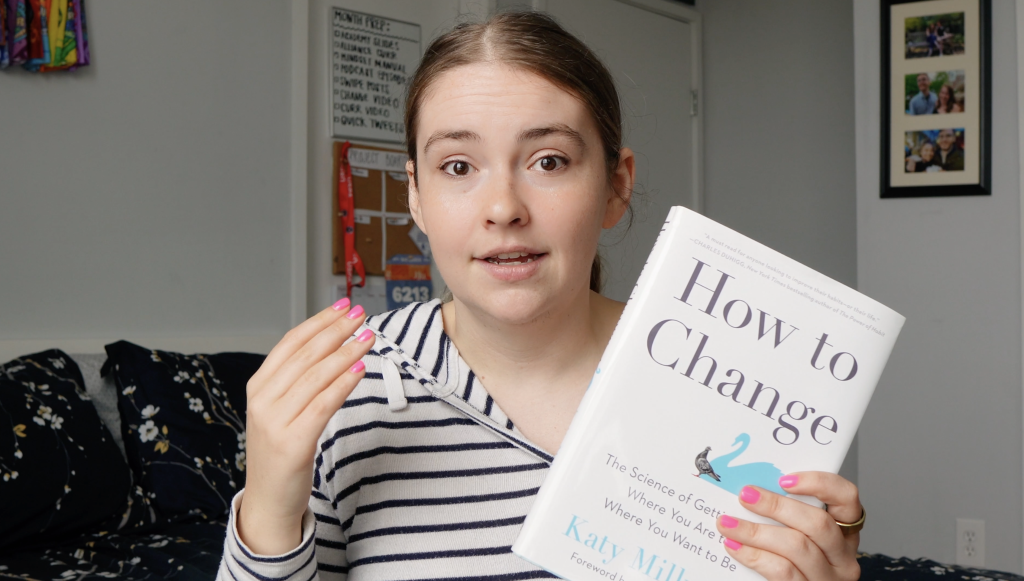
Book #5: How to Change by Dr. Katy Milkman
“How to Change” by Dr. Katy Milkman offers an overview of various change tools. It provides a surface-level understanding of different strategies, offering glimpses into how they work and providing a few practical examples. Readers who have shared their experiences with me find that this book has been instrumental in developing a foundational knowledge of change principles. It’s like enrolling in Psychology 101, providing a broad overview of different topics.
Personally, as someone with a PhD, I found myself less engaged with the book. This is mainly because the information presented aligned with the science I had already learned throughout my doctoral studies.
However, this is actually a positive aspect, indicating that the book is grounded in evidence-based approaches.
So if you’re seeking a general overview of self-help concepts and tools, this book can be a valuable resource for you. It covers a range of topics and provides a solid introduction to the principles of change.
Conclusion:
In conclusion, those are my top five self-help book recommendations. However, I want to emphasize that if you’ve been reading self-help books without experiencing significant change, it’s not your fault.
Human learning operates in a pyramid-like fashion. Books provide the foundational information, but true transformation requires more. We need to practice, engage in exercises, and apply the knowledge in our daily lives to see tangible results. It’s like if you read a book on how to ride a bike expecting to effortlessly balance and ride it the first time you get on (it doesn’t work that way).
If you’re looking for a chance to bridge the gap between knowledge and action, to practice and grapple with change in a more immersive way, I invite you to explore our Change Academy membership.
It’s a comprehensive resource for change psychology tools, offering updated and more scientific insights. It’s designed for those who crave a deeper understanding and practical application of these concepts. Inside the membership, you’ll find worksheets, coaching support, and engaging events to enhance your change journey.
REMEMBER, READING SELF-HELP BOOKS CAN BE ENJOYABLE AND INFORMATIVE, BUT IF YOU’RE SEEKING REAL TRANSFORMATION, THE FORMAT ALONE MAY NOT SUFFICE.
Don’t blame yourself if you don’t see immediate changes. Instead, consider exploring alternative avenues like the Change Academy to truly close the gap between knowing and doing.
By the way, if you’re loving the education you’re getting here, make sure you’re signed up for my Tuesday toolbox email list.
Click here to join in the fun!
Every single Tuesday I send out information on a concrete change skill, like cognitive flexibility or growth mindset, along with tips and tricks for how to adopt that skill and grow it in your own life. This is content I don’t talk about anywhere else. It is exclusive to my email list, so you will only get it if you subscribe here.
COACHING & MEMBERSHIPS:
⭐️ 1:1 Help + Accountability (Alliance Coaching)
📚 Monthly Workshop + Education (Change Academy)
FREE RESOURCES:
🗺 FREE Future Self-Mapping Mini-Course
📧 Get weekly behavior change tips, delivered to your inbox.
BODY BRAIN ALLIANCE: Compassion-First Change Education
📲 Follow Body Brain Alliance on Instagram
🌐 Website: https://bodybrainalliance.com/
